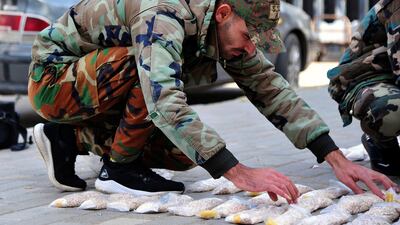Sometimes it comes hidden in a crate of tea. At others it’s disguised to look like a fava bean, or delicately moulded into the shape of a hummus bowl. No matter the method of concealment, for years millions of pills of Captagon, a highly addictive drug from the amphetamine family, have found their way into ports across the Arab world. For authorities in the region the scale of the problem has demanded constant vigilance. Captagon-related busts frequently make headlines in Saudi Arabia and the UAE.
This week, the sense of urgency spread to the US, where Members of Congress are urging President Joe Biden to increase American support for Middle East allies combatting the Captagon trade. The drug, known to pharmacologists as fenethylline, was developed in the 1960s as a treatment for ADHD and depression. But its addictive nature and negative side effects quickly became known, and the US took steps to ban it in 1981, with most other countries following suit.
Nearly a decade ago, however, the drug gradually re-emerged as an illicit stimulant of choice in the Middle East, where it was first introduced by criminal gangs from South-East Europe. Its manufacture and distribution was swiftly co-opted by an established nexus of militants and drug runners.
The problem is particularly severe in Syria, where civil war has left huge swathes of the country in the hands of corrupt officials and organised crime, as The National highlighted in an in-depth investigation last year. Thomas Pietschmann, an expert at the UN Office on Drugs and Crime (UNODC), warned that the Captagon trade had become a hallmark of business in government-held Syrian territory. The drug is thought to be one of Syria’s largest exports, valued at more than $3 billion a year, giving the government in Damascus little incentive to crack down.
“The problem is,” one Jordanian official told The National last year, “there is no security partner on the [Syrian] side of the Jordanian border.”
The drug’s connections to Syrian regime-held areas are the primary impetus for the Captagon Act, a bill introduced by US Congressman French Hill, which was passed in the House of Representatives in September and is awaiting a vote in the Senate.
The aim of the Captagon Act, Mr Hill told The National, is “to think through how do we…cut off the funding as a result of Captagon to [the Syrian] regime?”
But the challenges posed by Captagon extend far beyond Syria. The web of middlemen with a hand in the trade features a wide array of terrorist groups.
Smuggling routes reach deep into Iraq, and sometimes follow tortuous paths that lead to ports in Europe before doubling back to the Middle East. Hezbollah, the militant political party controlling much of Lebanon, is an especially influential player; it has been a force in the regional drug trade since the 1980s.
While America’s sudden attention towards the Middle East’s Captagon crisis is driven largely by its security concerns in Syria, greater efforts on the part of the US, the region’s largest security partner, towards getting to the root of the problem and helping to bring criminal enterprises to justice will be welcome. For Washington’s allies in the Middle East, the problem has always been much more intimate than geopolitics – a matter, first and foremost, of public safety and public health.


